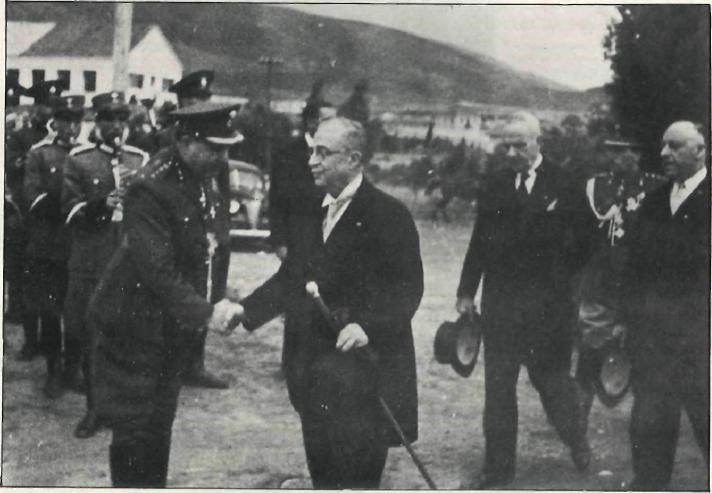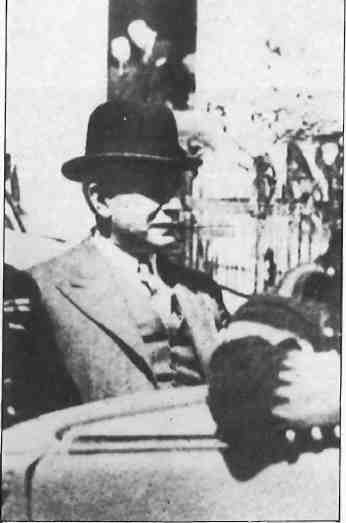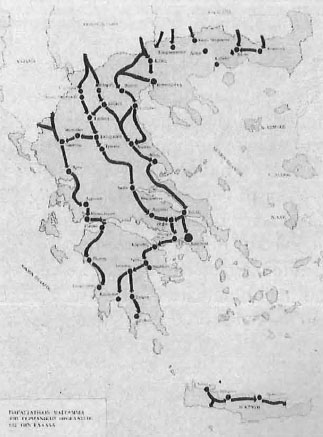After Albania had been militarily subdued and proclaimed an extension of fascist Italy, Mussolini, hoping to emulate Hitler’s successful blitzkrieg through western Europe, turned his covetous eyes on neutral Greece. It was not to be the easy victim he anticipated, however, and his ultimatum, dishonorably handed to the Greek prime minister as Italian troops were already pouring over the frontier, was characteristically rejected with scorn.
That memorable day when the Greeks said “Ohi” (no) to the ‘invincible conquerors’ is still rightly celebrated with national pride: the invaders were repulsed and forced back over the border deep into Albanian territory, giving the Axis its first bloody nose. What is not remembered so readily is that small, rather ill-equipped Greece said ‘no’ twice within six months to the most voracious dictators in Europe.
At the height of the Greek/Italian winter campaign some months later, the Greek prime minister, Colonel Metaxas, unexpectedly died. He had governed as absolute leader for over four years and left the country devoid of democratically elected institutions.

King George II of the Hellenes stepped into the vacuum and ‘appointed1 Alexander Koryzis, a conscientious, conservative royalist, Minister of Social Services and an ex-governor of the National Bank of Greece, as the new prime minister. It was an unexpected choice, given the wartime situation, particularly as Hilter had just begun his long-awaited push down through the snow-covered Balkan peninsula. The world watched helplessly as the insidious tentacles of Nazi power inexorably spread south, reaching the Bulgarian/Greek frontier within two months.
Just before dawn on 6 April 1941, the Koryzis household was awakened by the clang of the doorbell; Prince Erbach, the German ambassador wished to see the prime minister urgently.
When Alexander Koryzis hurried into the drawing room, the prince, who remained standing stiffly, handed him a brief note informing him that the German army would invade Greek territory within half an hour – at six a.m.
After reading the ultimatum, Koryzis quietly replied, “Mr Ambassador, Greece will not allow the German troops onto her soil: she will defend her freedom and independence and will resist with whatever strength at her disposal.”

Later that day in an interview with the owner of an Athenian newspaper the prime minister reiterated: “Greece has now burned her bridges. The decision to resist the German attack is unshakable. Despite the advice of those who are supposedly prudent there was not a moment’s hesitation. Greece’s standing today is so very high that no such hesitation is permissible however tragic the fight we will undertake against two empires must appear.”
As most Greeks were only too aware, for days German forces had been ostentatiously deploying their vast panoply of tanks and heavy guns before the Metaxas Line of fortifications which extended the length of the frontier.
At first light the savage attack commenced, supported by heavy artillery fire, while bombs rained down on the sleeping towns of Drama, Serres, Siderokastron and, with particular severity, on Piraeus, where they scored a direct hit on a ship loaded with explosives. The ensuing blast destroyed half the waterfront and blew out windows as far away as Psychiko, the northern suburb of Athens.
Greece, which had been fighting victoriously against the Italians for five months, was now compelled to defend itself on the Bulgarian frontier against an aggressor greatly superior in numbers and eciuipment. Nevertheless, its ferocious resistance astonished the German invaders and brightened for a time that bleakest of bleak winters in occupied Europe. Surprise and admiration expressed in superlatives made banner headlines in newspapers throughout the free world, nowhere more than in Britain which stood almost alone at that time in opposing Nazi expansionism: the spirit of Thermopylae and Marathon lived again.
Under the title “The Glory that IS Greece”, a New York paper wrote: “Whatever the outcome of the battle in Greece, we recognize that a small country has again become great. The sacrifice of Greece gives new courage and its heroism gives birth to new hope in all who love freedom, wherever they are found. One word only is apt ‘GLORIOUS’.”
The unbelievably heroic performance of the solely Greek troops manning the Metaxas Line, which sustained the full brunt of the initial massive German attack, remains the stuff of legend: some fortifications were defended to a man, while outside others the Germans presented arms to honor the handful of survivors.
Inevitably, the tide of aggression could not be contained and on 9 April the Germans broke through to reach Thessaloniki, where a partial cease-fire was signed and the brave fighting men in eastern Macedonia and Thrace were ordered to lay down their arms. Elsewhere the struggle continued.
Spring had come to central Greece, coloring the countryside with wild flowers and blossoms. But the physical beauty seemed only to accentuate the prevailing nightmarish conditions where three Allied divisions, one New Zealand, one Australian and one British, fought desperately alongside their Greek comrades in an effort to stem the savage onslaught of the highly mechanized German forces.

Continually bombed and strafed by the numerically superior Axis air force, they contentiously battled for each hill, river, wood and pass, constantly falling back and regrouping. Meanwhile, in Albania, the Italians managed to retain the positions they had retreated to before the German invasion through Bulgaria and later Yugoslavia while the Greek army there was caught in the stalemate of pinning them down.
Despite the deteriorating situation, decisions of national importance had still to be made and implemented by the government in Athens, where the king and cabinet ministers were in almost constant session. Knowing full well that occupation was only a matter of time, they had to solve the thorny dilemma of whether to stay on until surrender or to evacuate a governmental nucleus to Crete or Egypt and continue the struggle from there. Contingency plans were eventually drawn up for evacuation to Crete; meanwhile they worked on.
On Good Friday, as church bells aptly tolled for the crucifixion, a dispatch informed them that the victorious Greek army which had repulsed the Italians at such sacrifice had been cut off from the rear by advancing German troops. This tragic news stunned the ministers, their spirits sinking at the thought that the victors might become prisoners of the defeated Italians.
During a private meeting the king, expressing his despondency, reputedly said, “The situation appears to have gone out of your hands, Prime Minister.” Alexander Koryzis blanched, assured the king of his faithful service and, kissing his hand, requested to be excused. Without talking to anyone, he hurriedly returned home where he asked not to be disturbed and, a short time later, a shot was heard: he was found dead at his desk.
Koryzis’ colleagues could barely take in this new turn of events. Later, not wishing the enemy to know of his suicide, they issued an official communique simply stating that he had died suddenly. As the corte’ge moved off after his funeral the following day, there was a sudden German aerial attack on the city. No one in the large crowd of mourners ran for cover: all walked slowly on in silent, dignified indifference out of respect for the man
who, in accordance with the wishes of the Greek people, had unhesitatingly said ‘no’ to the enemy.
There was little of the customary joy and renewed hope that night as Orthodox Christians gathered round their churches to celebrate the resurrection, a religious ceremony which became symbolic of freedom and liberation. According to eyewitnesses the Athenians, hungry and many in mourning, were calm, orderly and proud, in full knowledge of the fate that awaited them.
For some days, King George shouldered the duties of governmental president and appointed Admiral Sakellarios vice-president who, after wryly remarking “Have we sunk so low, your majesty?”, accepted the post and worked round the clock planning and organizing the orderly withdrawal of all ships of the fleet to avoid their dispersal or capture by the enemy. In this he was almost entirely successful and the Royal Hellenic Navy, as it was then called, survived with few losses to fight many a famous battle at sea.
It had been timely work as on Easter Monday, after sustaining weeks of punishing attacks, General Tsolakoglou, military head of the Epirus troops, and two senior colleagues signed an unauthorized surrender to the Germans at Ioannina. Although immediately repudiated by the Chiefs of the Hellenic Army Forces, in the confusion of wartime communications the damage had already been done and hostilities in that part of the country ceased. Tsolakoglou, within the month, became the first ‘quisling’ prime minister of occupied Greece.
Time had run out and on 24-25 April, the king and leading members of the cabinet left Athens for Crete. Although some Allied and Greek units still fought on courageously in central Greece, troop evacuation had begun. Athenians waited stoically for the in-evitable, hut not for long, as early in the morning of 27 April, the first German soldiers reached the shuttered, deserted-seeming capital; the occupation had begun.
Axis forces had still to subdue the southern Peloponnese, however, arid Crete did not fall for another month. All in all, it had taken the two best-prepared armies in Europe an astonishing seven months to capture the last, still tenaciously held, Greek.outpost. The protracted struggle had cost them dearly in lives, equipment, invaluable time and prestige. It was indeed Greece’s finest hour.







